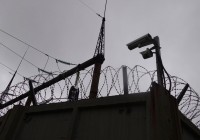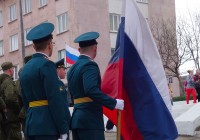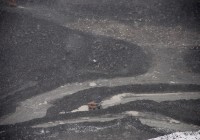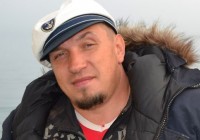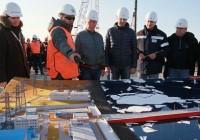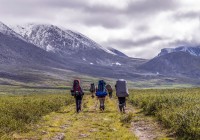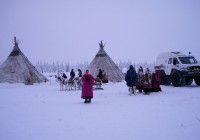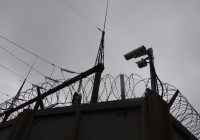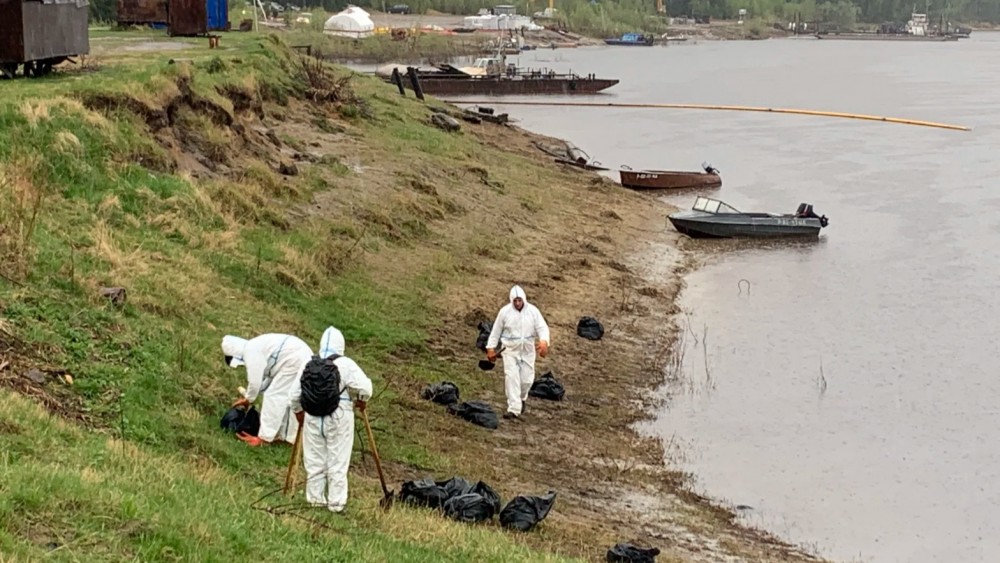
Between life and oil
ADVERTISEMENT
By Tatiana Britskaya
In the newspaper «Usinskaya Novi» only one of the 36 pages is devoted to the oil spill. The newspaper is distributed free of charge in general stores and it belongs to the mayor’s office. The unsigned text says that «measures to eliminate the consequences of an oily liquid leak are reaching the final stage.»
We are talking about the oil spill at the LUKOIL-Komi field, which was discovered on May 11. According to the company, the volume of crude oil that came in contact with land and is in the water was 100 tons. To check the data of this bill is impossible but ecologists estimate that the number might be as much as five times more.
The neighboring column in the Usinskaya Novi is occupied by a report from the district championship in short track running races. But in real life, residents of Ust-Usa have nowhere to run. After the exiles were allowed to leave during the thaw, only the indigenous people remained in the village. Many generations have been born and died here on the banks of the Usa. But never before has the river that fed these generations become dangerous. The waters of the Usa are now deadly. This is new. It has never even occurred to people here not to drink, swim or fish in the river.
That night when the oil arrived, Nikolai Nikolayevich Fedorov woke up at 3 o’clock in the morning. At 5 am, he was already on the river. In the North, the nights are bright in summer and the black ice flowing along Usa was easily visible.
The ice came from the Kolva, the river flowing into the Usa and as soon as it opened up, ice floes with black shiny puddles began floating across the Usa’s waters.
Fedorov walks along the wet grass under the steep bank. About 15 meters from us, there is a yellow oil collecting boom on the water. The floating apparatus was brought in on May 14. The floating booms are used to restrict the spread of the spill but here, they do not cover even half of the fairly shallow river. There is little water this spring. There was little snow in winter. Every day the water leaves, exposing the coast and leaving more oil from the spill on it. Fedorov scratches a stain on a river rock with his finger. It smells of oil.
ADVERTISEMENT
The spill happened on the Kolva, more precisely according to LUKOIL-Komi, 300 meters from the river. However, neither local residents nor environmentalists are allowed on the scene of the accident. The «Pechora Rescue Committee» activists, a local environmental organization, were promised access on May 24. But the trip was canceled at the last moment and therefore, there is nothing to do but to take Lukoil’s word for it. However, the people of the town of Usinsk do not want to take Lukoil’s word for it. To them, the oil giant’s words have always conflicted with the truth.
On May 14, the head of the Komi republic, Vladimir Uyba, said that the volume of the spill was small and only about 7 tons of crude oil made it into the river. Then LUKOIL gave a figure that was 10 times more. Later, Uyba clarified for us that 90% of the spill remained on the ground and only 9 tons actually made it into the water. But these “9 tons” have been flowing along the Kolva, Usa and Pechora Rivers for three weeks now and this despite the fact that they have been continuously trying to collect it since May 12. The spill has now covered 450 km, reaching several villages and settlements including Mutny Materik, Shchelyabozha and Ust-Tsilma.
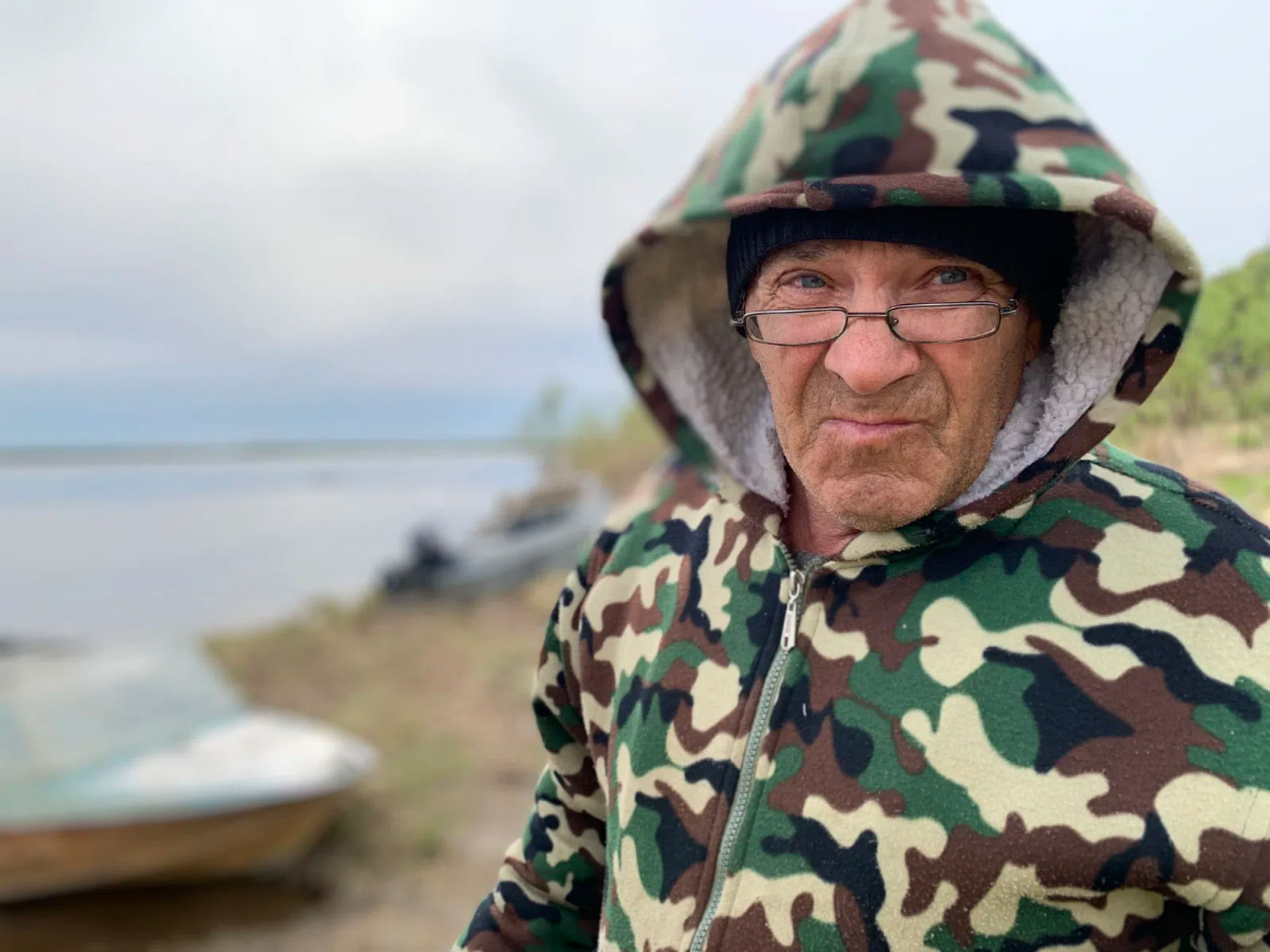
“We would not have noticed 9 tons even in Kolva, let alone in Usa. Everything would have dispersed into the water,” says Fedorov. He has a lot of experience in observing oil spills, like all the locals. They unanimously say that the oil flows every year. The last time was 7 months ago, in November. But there have been three major accidents over the past 30 years: the 1994 spill at the Kharyaga-Usinsk oil pipeline of the Komineft company, recognized as the world’s largest onshore oil spill, the spill at the Rusvietpetro pipeline in 2013 and now, the current one, courtesy of Lukoil.
«Just wait. The oil will leave all by itself.»
It flowed here in the 80s but at that time, they were drilling less and farther from the villages. At that time, all of the oil work was out in the tundra. Now the nearest drilling is only 3-4 km away from the villages.
At the Usinsk airport, visitors are greeted by a poster: “LUKOIL-Komi is celebrating its 30th anniversary!”
When they first arrived in these regions, the company assumed obligations to eliminate old spills and the entire Soviet infrastructure of the oil fields. However, pipeline renovation is slow and there are hundreds of leaks that have been found. According to Ivan Ivanov, the chairman of the «Pechora Rescue Committee», a local environmental organization, based on the data of the Central Dispatch Directorate of the Fuel and Energy Complex, in 2015 alone, there were 752 leaks. They found 616 more in 2016, 598 in 2017 and yet another 590 in 2018.
At the same time, the company insists that pipe diagnostics for the entire internal infrastructure including underwater crossings have been conducted annually. It is these statistics that are mentioned by the director of the enterprise, Alexander Golovanev at the request of the «Committee». And the pipe that burst this time was actually new and had only used up half of its 10-year warranty period.
At the same time, after the accident, Rostekhnadzor, the ministry of ecological preservation, found that the oil-gathering reservoir had not been up to spec for strength, corrosion resistance or general reliability. There had been no possibility to guarantee that the collection system would remain closed and minimums for tightness and product safety had not been met. Based on this evidence, though just a little bit too late, the court suspended operation of the site.
Ivanov believes that the issue is improper system controls and that fully modern monitoring is required. The head of Rosprirodnadzor, Svetlana Radionova, writes on Instagram that it is time for the companies to finally «conduct an inventory of the condition of their facilities and establish normal diagnostic and maintenance regimes». And she promises to deal with LUKOIL in court.
Environmental engineer Alexander Sladkoshtiev, deputy chairman of the Pechora Rescue Committee, suggests that the scale of the May spill is greatly underestimated in official reports. Based on open data from the Osh field and according to official statements, he calculates that the facility produces 2,000 tons of oil every day. For the 6 hours that the leak was in process before its discovery, at least 500 tons should have spilled out. This is the minimum if the pressure had not been increased. There is also double talk at play in using words like «oily water with a low content of proper hydrocarbon» to describe the situation. The «oil water cut” is a coefficient reflecting the specific proportion of water in the production of oil (oily liquid). The actual oil water cut percentage of the Osh field is very low, only 0.18%. Consequently, there was not much water in the contents of the pipe and practically only oil flowed into the river.
Another point that the locals and «Luki», as the management of the oil company is called here, cannot seem to agree on is the date of the accident and a genuine estimate of the volume of oil released depends on it. Oily film on the Kolva River was spotted on May 11. But until that day, the water was under the ice and what was under the water is unknown.
In general, leaks of this kind are detected at oil metering stations. If the volume at one of the stations starts to fall, this indicates that there is a spill somewhere. But Radionova claims that «there are no metering stations anywhere for this project». The WWF, the World Wide Fund for Nature, after analyzing satellite images, claims that the first signs of reservoir leakage appeared in March.
Valery Dantsevich, a resident of the village of Kolva says that they got a call from men who work at the oil field in April telling them to expect oil flowing soon into the river.
Many people have their eyes on LUKOIL here. The oil business is killing the villages but at the same time, it never lets them die. People depend on their money. There are no other jobs.
Albina Dantsevich takes out an old photo. In the frame, Valery is showing his hands, which are smeared with oil. This photo is from the 1994 oil spill.
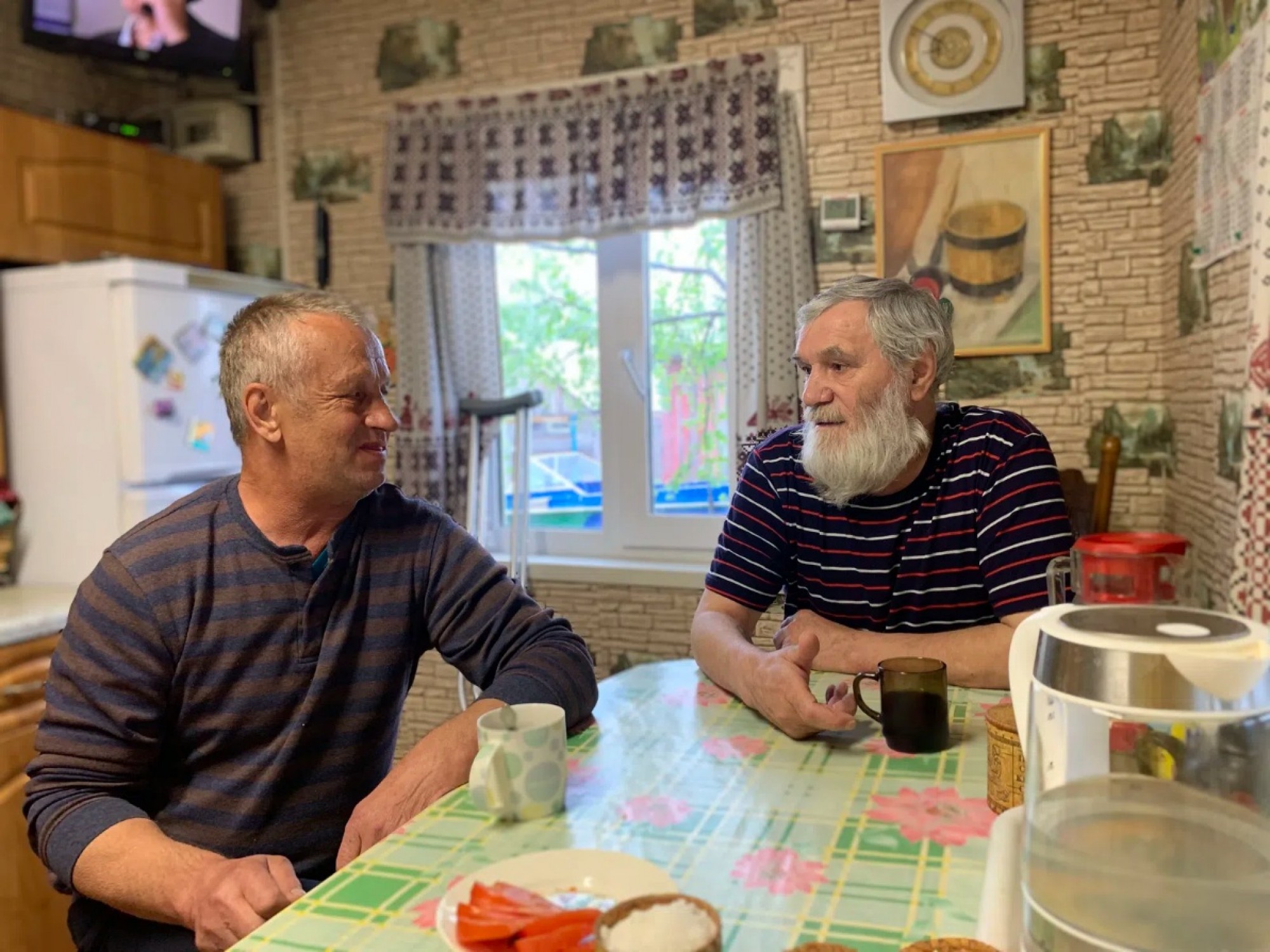
“There was oil in the meadows and then in the fields,” says Dantsevich.
“They couldn’t dig up any worms. If you went into the bushes, you would come out all black,” his neighbor Anatoly echoes. Anatoly remembers that it used to be possible to go and get some milk. This now has become a luxury. After that spill, the state farm cows died and the herd has never really recovered. The agriculture that once lived here is now in eternal crisis. Albina leafs through the correspondence of villagers with officials from 2013 when the cows fell from the cold and their frozen corpses lay on the farm. Then the electricity was cut off for debts.
«And then the deer went bald.»
“The Potatoes rotted after spills,” complains local photographer Nadezhda. In the room where we are talking, there are seedlings in jars. People continue to grow food in their gardens despite the fact that the soil is poisoned. Nadezhda has health problems now in her thyroid gland. This is also true for many in Kolva. She does not associate the disease with oil. She was diagnosed in her youth. She says that in the year of her birth, there were explosions in Novaya Zemlya. Her father was a hunter and after this, he recalled that the deer in the tundra all went bald and the children became sick. Nadezhda shows her pictures on her tablet of Kolva and the village of Kostyuk, where her family is from. The village is no longer there and a few years ago, relatives put a stone there in memory of their ancestors.
“We are not needed. Soon, we will not even be. There will be drilling and shift camps here and nothing more.” These are the words of Nikolai Fedorov. He is also an activist of the Pechora Rescue Committee. The organization consists mainly of villagers who, since the 80s, have been fighting to keep their land clean and to preserve their rights to live their lives. But there are fewer and fewer willing to fight.
“People have resigned themselves. They don’t think that anything will ever change. It seems to me that they just don’t give a damn about all this anymore. Well, I’ll tell you the truth and everybody knows this: People just grumble but never do anything about it and this is what it comes to. On May 9, three of us with some of our pensioner friends wanted to walk through the village with flags. But one of them got scared that they would be fined. And he told us that he was afraid. Our pensions are really small and there is never an extra ruble and especially so to pay fines. You can’t get fat even though we live on oil. And the majority here live as if this is the way it was meant to be. They live as though they have received a sentence to live this way,» says Fedorov.
Fedorov was born and raised here but his Karelian father did not come to this region of his own free will. His father was a soldier who returned from the war but was deprived of awards and sent to the camp after the death of the cattle on the collective farm. Here he forgot the Karelian language and began to speak Komi. His Grandfather was shot even earlier, in 1937. In Usa, Fedorov Sr. worked on geological expeditions. He was part of the group that went looking for oil. Now his son finds oil in his home.
Nikolai Fedorov is a rural philosopher. Standing by the dead water, he says that the reason for what has happened is not rusty pipes but greed and lies.
“They lie and lie to us. Nothing else. These are not our people. These are only temporary workers. They are only here to grab what they can. They want to put a drilling rig between us and Novik, a neighboring village only 5 km away. All of their oil will flow through the stream.
When LUKOIL arrived here, it staked out everything for itself. Everything became a part of their territory. And then they messed up everything. They pay us off with playgrounds but they are all in bed with the authorities. LUKOIL is the owner here. And what can you do to them if Alekperov is sitting at the table as Putin’s right-hand man?»
«Black ice, red rain»
“The fish stink of oil and no one will eat it. Yes, and it is scary in a frying pan with such a smell. You need a fire extinguisher standing by because it’s an oil product,” Fyodorov is joking but then he adds that this is not the first time the fish has smelled like oil. This happens every year here.
The Usa found itself rated amongst the dirtiest rivers of Komi back in 2014. The state environmental report on regional waterways dropped its rating to 4th class, dirty water, noting repeated cases of extremely high pollution. Iron compounds reached 1260 MPC, the maximum permissible concentration. Copper was at 57, lead at 27 and nickel at 13.
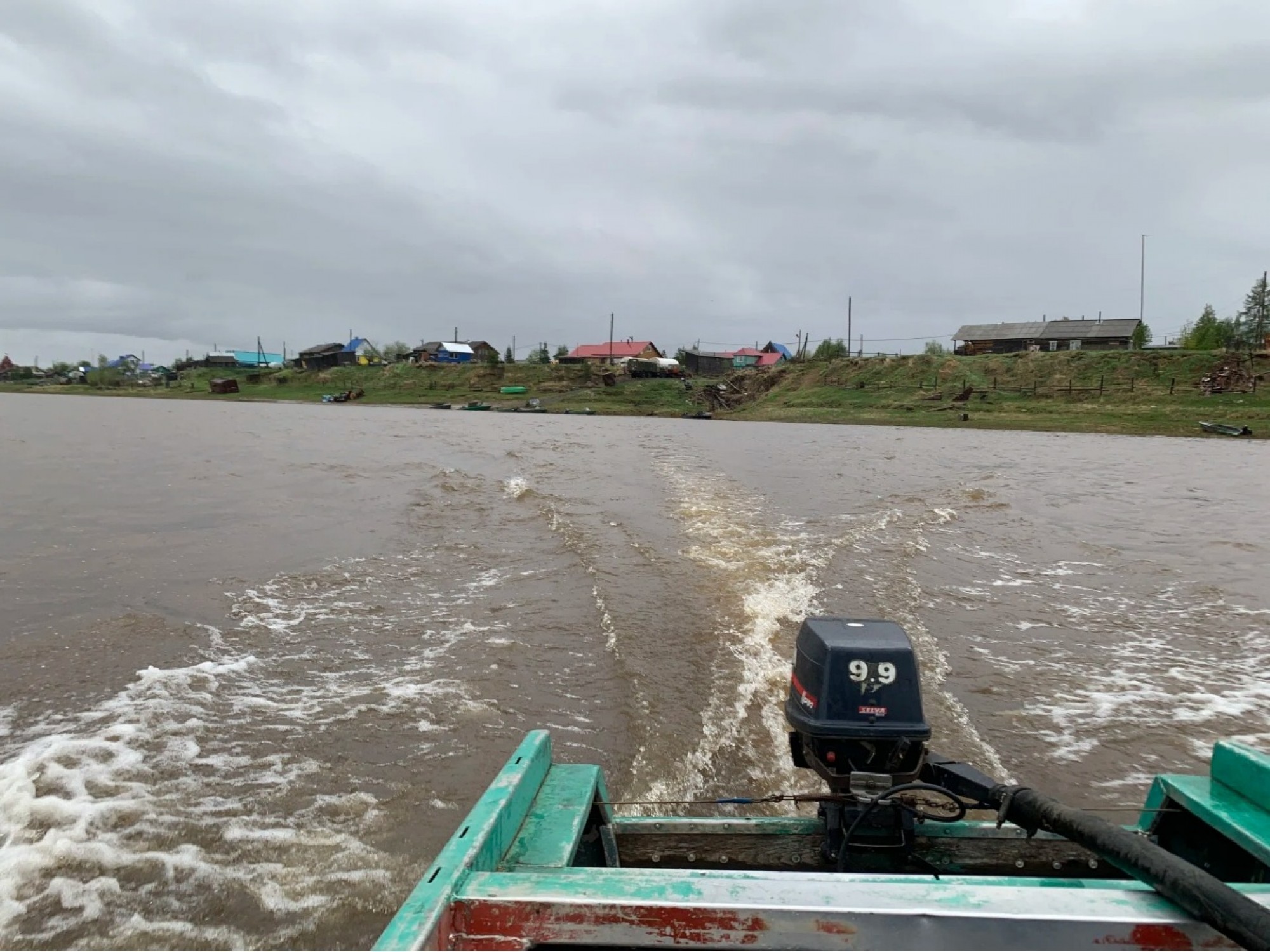
Neighboring Kolva is also poisoned. “Nelma, chir and whitefish. Everyone used to catch these fish. Now even pike have become expensive,” says Nikolai Patrakov, a resident of Kolva.
“Everything is tied to the river. This has always been our way of life in the Pechora region,” explains Ekaterina Dyachkova, deputy of the State Council of the Komi Republic and an activist of the “Pechora Salvation Committee”. Ekaterina has been in Novikbozh all her life. She works as a biology teacher in the neighboring village of Ust-Usa.
“There is simply no hope for this river. And for many, this has been their means of subsistence. They have always eaten what they catch and live quietly by fishing and picking berries.
Perhaps now they will collect some crumbs and sell them to pay for electricity and firewood. All of the valuable forests where there used to be adequate hunting have already been cut down to make way for sand and gravel pits. Everything was done to take care of the needs of the oil workers.
And these days, they don’t even need environmental hearings to do anything they want. It doesn’t matter if you agree or disagree. Nobody asks us for any opinions. They just decide that the facilities are non-hazardous and they move right ahead. «
Nikolay Khozyainov from Novikbozh worked as a haymaker after the 1994 spill. After this, red rain fell from the sky and the hay rotted in the haystacks. But no one ever explained why the rain was red.
As we float along the Pechora channel by boat, there is a characteristic smell coming from the water. This is the smell of money. It is floating on the water all around us in muddy rainbow stains. We have not traveled very far from Novikbozh, only about three kilometers, but there are no signs of oil collection at all.
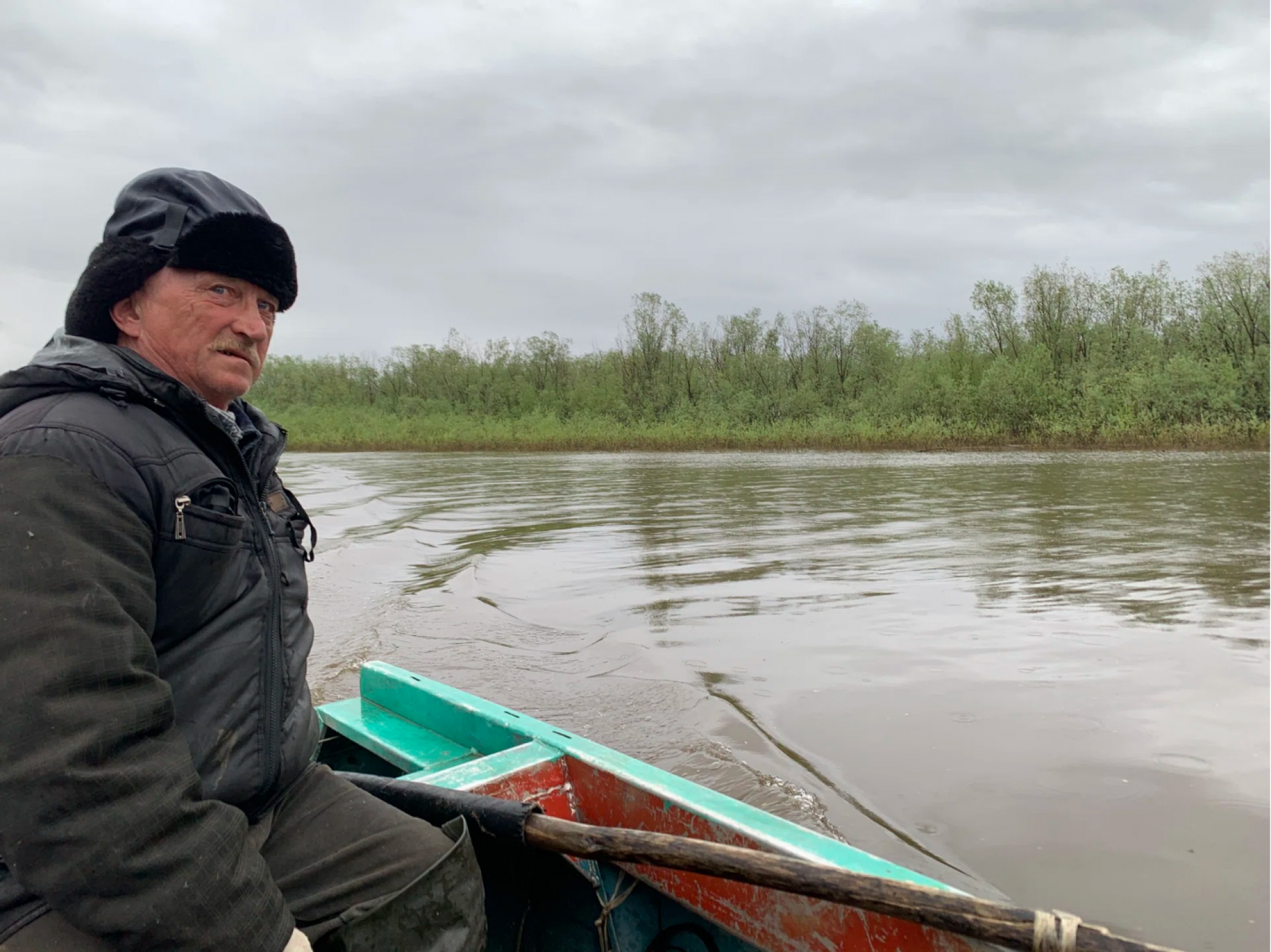
“No one came and no one has collected anything,” says Dyachkova. Sergei, the owner of the boat, pushes his ore down into the willows along the bank and muddy streaks immediately rise to the surface. Sergey is a fisherman and a hunter but this year, he will not fish in Pechora.
“The main slick went downstream so the river looks like it is clean. But the oil settled in the willows, in the bushes. When the water subsides, all the bushes will be black.
“I was on the third and fourth bridges today. The water has dropped by a meter and now, all the banks are covered in a meter of oil,” says a guy in camouflage who entered the general store. The 3rd and 4th bridges are upstream, closer to the spill site.
Ekaterina Dyachkova, an activist and a deputy of the Komi State Council had this to say:
- On May 11, I arrived in the evening after work. The first bridge was clear. There was no ice. We went a little upstream and then downstream and then back along the coast. And on the second day, the oil was already flowing. They caught the ice with traps, loaded it with an excavator and took it out. It is almost impossible to completely remove the oil in this way. It’s good that the waterway is small.
Then I flew around the area as part of the flood commission. And it was clearly visible how the oil slicks moved along the rivers. We flew over the area of the third bridge and the second bridge but there wasn’t a single line or any booms. The silence was deafening.
«The country needs oil - bear with us»
“Nobody is removing any oil here. My brother and friend have started going to the lakes on the other side to catch some fish. What kind of fool is going to catch anything from the river now? The only reason to do this is if you want to experiment with your life,” said Galina Chuprova, a local truth-bearer. In Novikbozh, she is in charge of the mail and getting paid 70% of her normal pay. She complains that she cannot even do her job. No one here subscribes to newspapers or buys goods off the shelves. There is a payphone next to the post office. It is there so that residents can call an ambulance or firefighters. And though it is true that the payphone works with cards, the phone cards have never been delivered to the post office.
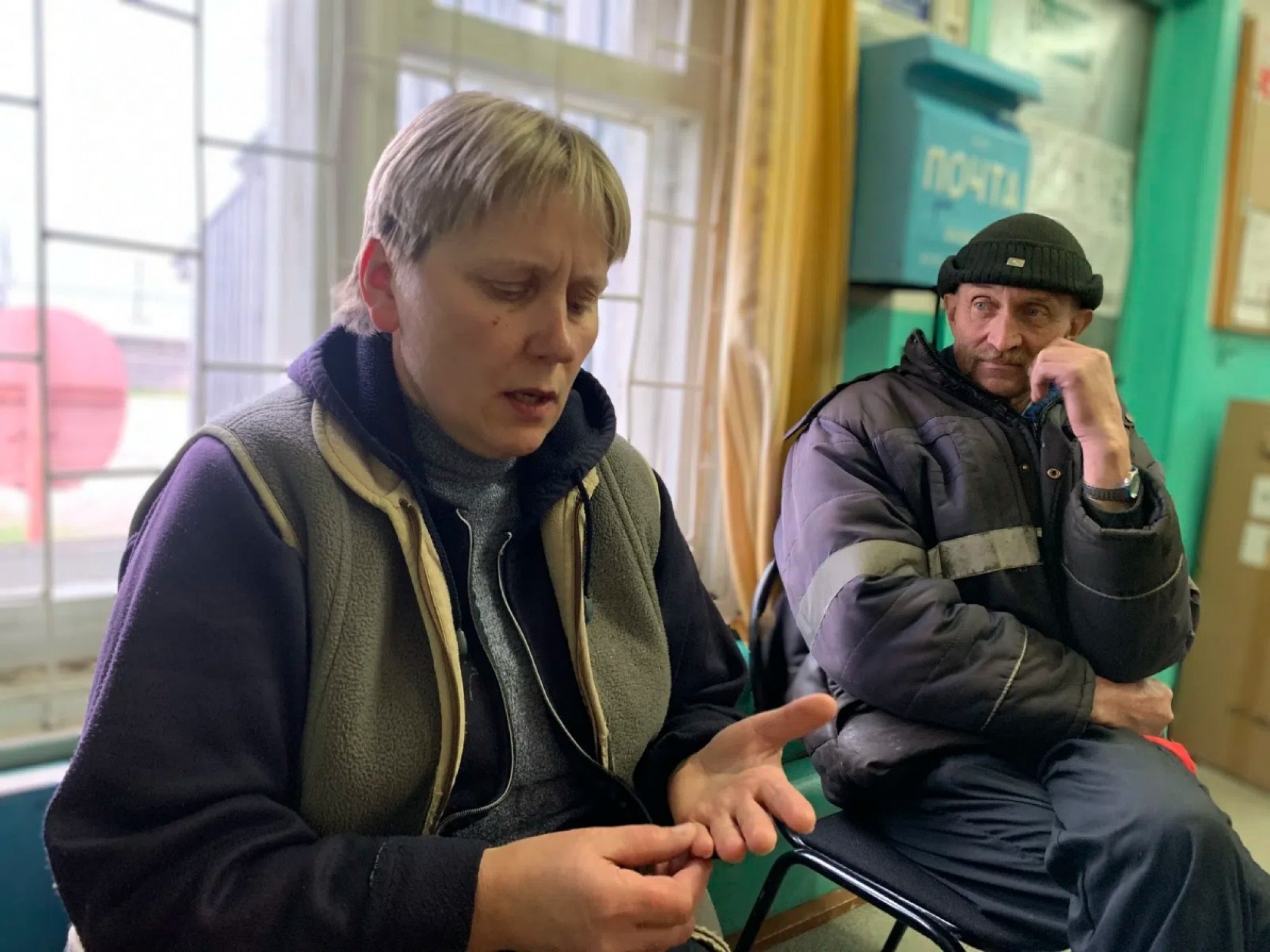
“They say that the locals are poachers. This makes me laugh. Local fishermen only catch what they need to feed their families. They do not need any more. But at the conference of the Komi people, they say that we are poaching. After I heard this, I never went back there. It’s all fiction. LUKOIL is the real poacher! Nobody has destroyed as many fish as they have with their oil spills!»
Galina has been observing this trend for many years. The fish, the water and the forest have all disappeared. Everything that the Komi people lived off is now gone. The pine forest outside the mushrooming village was thinned out by loggers when the oilmen carried out seismic surveys there. They laid explosives right outside the cemetery. And when indignant local officials complained, they replied that our churchyard, our village center, was not even officially registered anywhere. According to them, it was not even there.
“These explosions made the furniture jump around the room. We went to yell at them but their chief, a young man, answered that we were making this up! He said it just wasn’t true. And a few years ago, Golovanev, the head of LUKOIL-Komi, came to talk to us. He said, «You understand, the country needs oil, so bear with me.» This is what he said. But the country doesn’t need us? And what about when the well was burning 20 km away and everything was clouded with black smoke? What about when all of the residue fell on our lands, on our gardens and on us specifically? We had to breathe this air. And then the republican media said that nothing that happened posed any threat to the local population.
We live by our work. We are always busy. We grow our vegetables naturally. Someone is even raising watermelons in a greenhouse. We will soon plant potatoes. We were brought up this way. We work. I remember that in the 8th grade, I was given a ticket to the «Eaglet» pioneer camp at school. But I didn’t go. My mother told me that I had an eaglet on the other side of the river but the family had to prepare hay for the cow! It was still fun. People lived in the name of something. Now this is not the case.
When they say that «the republic has a social partnership with LUKOIL», this is ridiculous. The money from oil production goes to Moscow and just minuscule leftovers come back to us. But what influence do we have? Last year, they held elections for the heads of the republic but our opposition candidate was not even allowed to be seen. We supported him anyway. He is local.»
«I am your Putin»
In the autumn elections, Vladimir Uyba, the former head of the FBMA, the federal biomedical bureau, became the head of Komi. If he had acted logically and successfully in the fight against coronavirus, this would have sharply reduced incidences of chronic illness. Then he could have made contact with the population and especially been helpful about issues of the environmental agenda, which are difficult for people to understand. But no sooner had the scandal around the attempt to bite off a piece of the Yugyd Va national park for gold mining appeared, a new one burst out in the State Council. In response, Uyba implicated the communist Oleg Mikhailov as being responsible. Mikhailov was the oppositionist who was removed from the election for governor. Uyba also obscenely explained that he would set up a personal tete-a-tete with the leader.
This episode was hardly forgotten when the president of the Russian Federation himself responded to the villagers“ proposal to write a complaint to him. To the residents of the village of Mutny Materik, who were indignant that no one was collecting the drifting oil, Vladimir Vladimirovich addressed them personally saying the words: “I am your Putin.»
Talking with the population for a long time and in detail, which officials attempt on a regular basis, constantly turns into embarrassment. For example, when the head of the region came to Kolva to inspect the LUKOIL’s catastrophe site, the «Yuralys», as Uyba’s position is officially called in the Komi language, showed up with Aleksei Kuznetsov, the recently appointed minister of ecology, who was wearing a branded Lukoil jacket. And in the village of Mutny Materik, when asked whether someone would be punished for the oil spill, Uyba answered awkwardly:
“LUKOIL is an independent company. Only the president can punish them.”
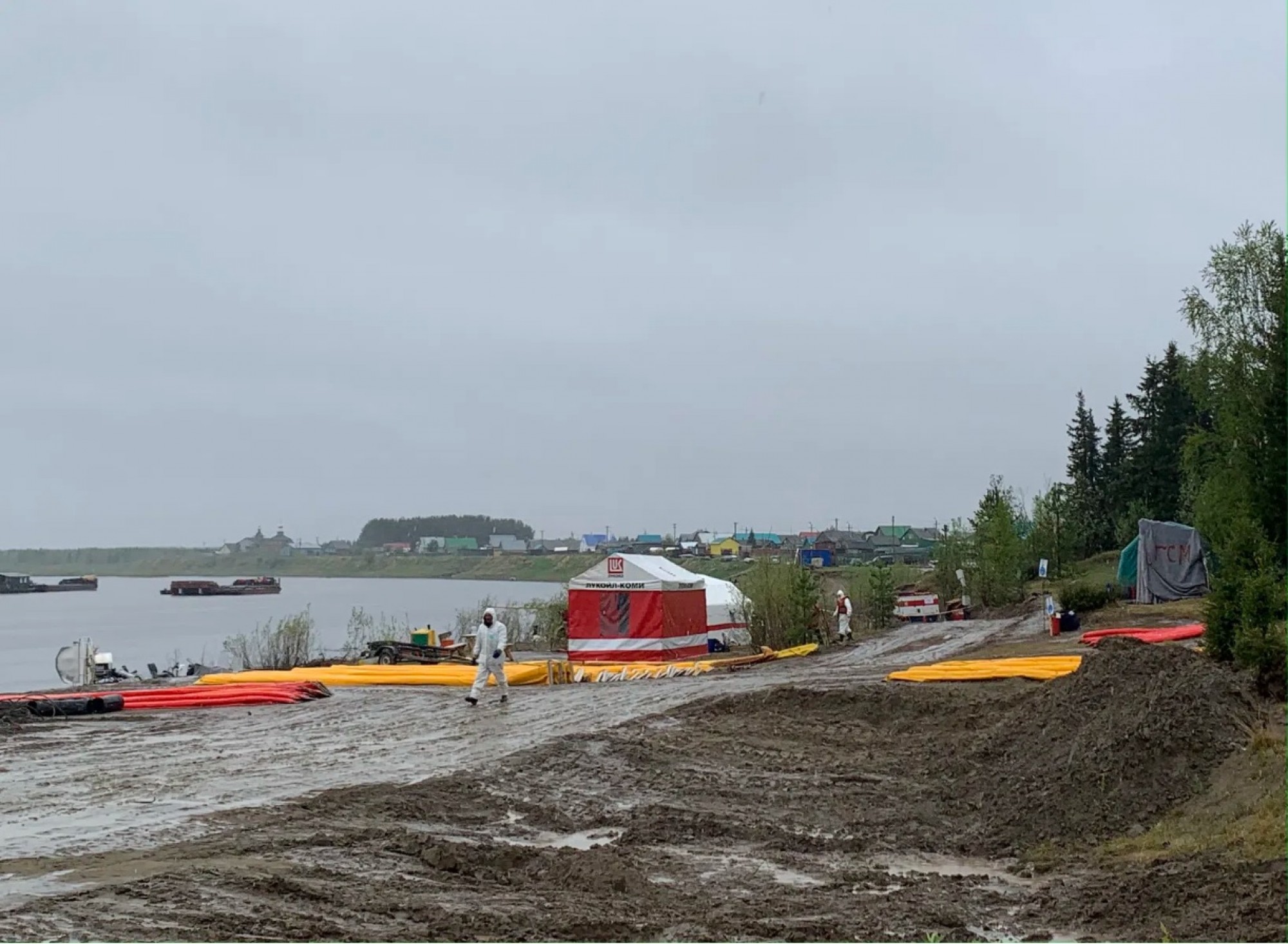
In addition to all of this, the other day Uyba even went so far as to say that the accident does not pose a threat to biological resources or humans. The press service of LUKOIL-Komi also reported that «nothing is threatening the settlements or economic facilities, including in the Arctic zone of the Russian Federation.» Meanwhile, the results of the Roshydromet water analysis in the Kolva River for oil products after the accident showed that there were 38 times the maximum permissible concentration of hydrocarbons present.
In Kolva, people in white tyveks, biohazard suits, crowd on the shore. They are trying to scrape the black grass with shovels for about thirty meters and then load it into sacks. “We have no relationship to anyone at all,” explained one of them, «We are from the LUKOIL gas condensate plant. They sent us here. We are here from dawn to dawn.» Earlier press releases reported about two hundred, but now there are only about a hundred oil collectors. These are employees of the company and one of their contractors. There were also announcements about the possibility of employment for the local residents. Additional forces in the form of units from the Ministry of Emergency Situations, for example, have so far not been involved in the disaster clean up. Here the word «catastrophe» is generally avoided.
Deputy Yekaterina Dyachkova rejoices in the rain. If enough water is collected in the barrels in the yard, we will heat up the banya.
Water is worth its weight in gold here. The well only gives out 8 liters at a time and is locked with a key. Keys are given only to local people by the administration. This is the situation for well water.
Novikbozh has 3 wells for 500 people. Water is transported in barrels and protected. True, it is still unsafe. Locals say that they are not even getting a new filter for water intake. But there is no other water here anymore. You cannot drink from the river. And when the new filter is installed, the water will have to be paid for.
So, on the banks of one of the largest rivers in Europe and 100 km from the oil capital of the republic, people collect rainwater to wash.
A second problem is firewood. There is no gas here and, apparently, there never will be or even any steam heating. Everybody must stoke their stoves with wood. Trees designated for local use are cut 25 km away on the other bank of the Pechora. You can transport the wood while the river is frozen. But it is difficult to get a ticket for cutting trees and you may not be in time before the ice drift. Firewood costs 6 thousand rubles a month (67 Euro) to heat a house and they are heated all year round.
Vagit Alekperov is the owner of LUKOIL. I wonder what part of his yacht gets paid for from the profits from selling water and firewood to the people whose land he has destroyed. I wonder how much should be enough.
And the yacht, according to Forbes magazine, is a noble one at 70 meters. The Galactica Super Nova, as it has been christened, has a crystal elevator, a waterfall and a helipad that transforms into an open-air cinema and dance floor. The estimated cost of the «pleasure vessel» is $105 million.


